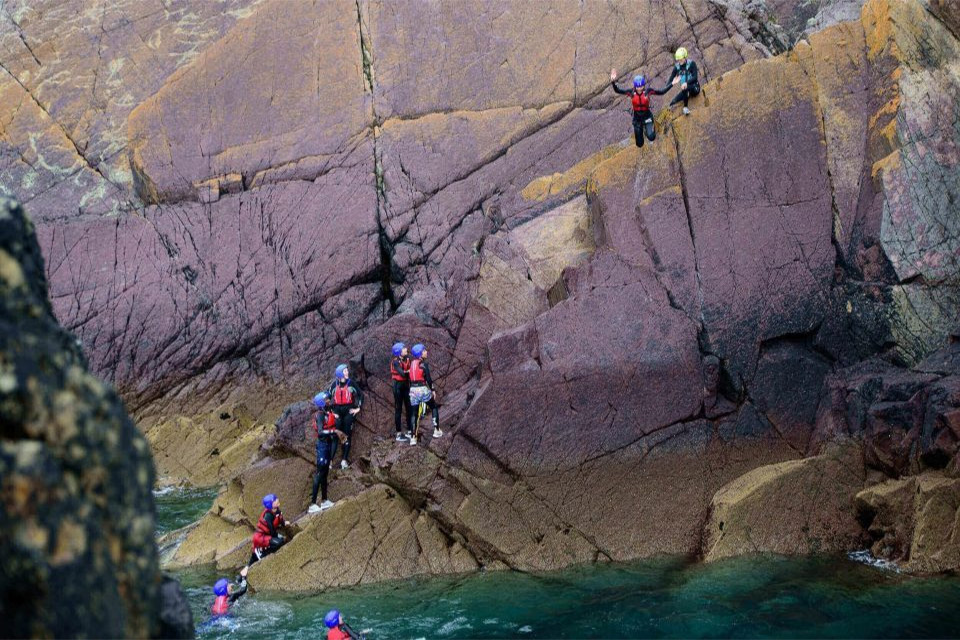Guest Post • Pre-College Advising
Why Are Summer Camps Important?
POSTED ON 01/15/2021 BY Marlborough College School of English and Culture

If you are lucky enough to have childhood memories of taking part in outdoor adventures, it is very likely that you have experienced the rush that comes with taking a risk, pushing yourself and discovering your capabilities.
There is a transformational thrill that lies at the heart of every great adventure; one that comes from the growth in confidence and the deepening of self-knowledge that accompanies the psychological and physical challenges posed by outdoor pursuits.
Outdoor adventures have long been linked to improvements in self-esteem, problem-solving and conflict resolution skills. They also lead to enhanced group bonding. From this list of benefits, it becomes clear why participating in outdoor adventures is so vitally important for young people. However, it is not only through scaling mountains or taking to the seas that these positive outcomes can be incorporated into a curriculum.
So how does summer camp benefit students?
The link between creativity and adventure:
Adventurous activities require us to quickly evaluate and respond to our surroundings and the potential risks they pose. Creativity, while often mistakenly attributed solely to artistic endeavours, is the ability to find “a novel yet appropriate solution to a problem or response to a situation,” a definition that highlights the connection between creativity and adventure and the transformative possibilities of both.
Creative and adventurous pursuits both require risk-evaluation, innovation, perseverance and originality. Both give rise to the sense of euphoria that follows the successful completion of a challenging task that takes us out of our comfort zone. Similar to outdoor adventures, creativity also has numerous well-documented benefits; helping to mitigate mental health problems, overcome trauma, improve our sense of self-worth and even boost our immune system.
Given the list of benefits and its applications to the world of work, it is no surprise that the ability to think creatively is championed as one of the most important skills for young people to learn by organisations such as UNESCO and the World Economic Forum.
Creativity and adventure in education:
Participation in a summer programme provides a perfect opportunity for students to step out of their comfort zone and take some creative and adventurous risks. A summer camp’s unfamiliar setting, potential language barrier, range of new activities on offer and the opportunity to collaborate with classmates offer the rewards of an education that incorporates creativity and adventure into daily life. Marlborough College School of English and Culture’s (MCSEC) residential summer courses for teenagers are designed to provide the lasting beneficial effects of creative and adventurous education in action.
The student-centred courses of morning tuition, Open English and Open Minds are structured around weekly modules, leading into a collaborative class project that provides students with opportunities to debate, develop their critical thinking skills, take part in performances and explore a wide range of topics from fresh perspectives.
The morning classes are complemented by an activity programme, which finds opportunities for creativity and adventure in the everyday. For example, the River Kennet that winds its way across the Marlborough College campus does not just provide a beautiful setting for an early evening walk but also offers a chance to practice ‘riverwalking’, an activity where students help each other as they scramble, climb and swim their way down the river.
The importance of the environment:
Though there are numerous potential benefits to be gained from successfully completing a creative or adventurous challenge, it is not as simple as pulling on a harness or stepping onto a stage. Studies have shown that improvements to confidence and self-esteem are only possible when challenges are undertaken within the context of a supportive and nurturing environment.
The need for risk-taking behaviour in a supportive environment is another reason why summer camps are the ideal time for young people to engage in this type of personal challenge. The self-contained environment and time spent with staff mean that experienced teachers can help students identify their limits and provide a safe setting within which teenagers can gradually set themselves greater challenges, academic or otherwise.
MCSEC consciously fosters an environment conducive to personal challenge and growth by focusing on two areas of great importance: timing and staffing.
Timing:
Both the academic and activity programmes are carefully designed to ensure that the students can grow in confidence, gradually overcoming small challenges and gaining independence while simultaneously extending the limits of their comfort zone. This can be seen in the progression of activities from a gentle riverwalk, to a midweek trip to the climbing wall, building up to a weekend trip of high-adrenaline activities such as sea kayaking, surfing and coasteering.
Staffing:
Building trust is fundamental between staff and students is fundamental. The MCSEC programme achieves this by implementing a team of staff who lead or participate in all the activities, as well as perform residential roles in the boarding houses and teach morning classes. This means that staff get to know all the students quickly, allowing them to provide excellent levels of pastoral care, creating an egalitarian relationship built on trust.
Watching a shy student go from visible discomfort when speaking in class to confidently delivering a speech as part of a class project in the space of two short weeks, or seeing how a group of friends encourage and support one another to overcome their fears in a day of coasteering, displays how these programmes have a profound impact on young people.
The Red Pen’s Mentorship Programme helps middle and high school students to develop a well-rounded profile that includes summer programme planning and applications so that they can stand out in a competitive undergraduate landscape. For more information, get in touch with us.




